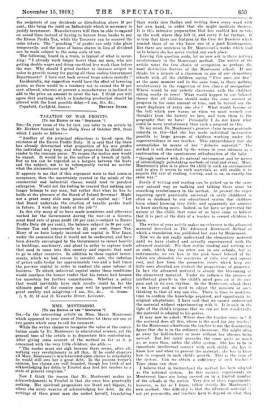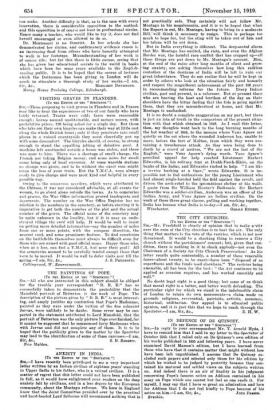MME. MONTESSORI.
[To THE EDITOR OP THE " SPECTITOR."1 SIR,—In the interesting article on Mme. Maria Montessori which appeared in your issue of November 1st there are one or two points which seem to call for comment.
While the writer claims to recognize the value of the contri- bution made by Dr. Montessori to educational science, yet the general tone of the article is to depreciate this contribution. After giving some account of the method so far as it is concerned with the very little children, she adds :— "The reader must not sigh because there seems, after all, nothing very revolutionary in all this. If he could disprove all Mine. Montessori's much-insisted-upon claims to originality he would still owe her a great debt. In the present writer's opinion, her claims are well founded, though her trick of not acknowledging her debts to Froebel may lead her readers to a state of general suspicion."
Now I think the reason that Dr. Montessori makes no acknowledgments to Froebel is that she owes him practically nothing. Her ipiritual progenitors are Itard and Sgguin, to whom she never wearies of acknowledging her debt. In the writings of these great men she soaked herself, translating
their works into Italian and writing down every word with her own hand, in order that she might meditate thereon. It is this intensive preparation that has enabled her to take up the work where they left it, and carry it far further. It is true that there are features in the Case dei Bambini which remind those Of us who know one of a good Kindergarten. But there are sentences in Dr. Montessori's works which lead us to believe she has never visited any such place.
Leaving this question aside, let us now ask is there nothing revolutionary in the Montessori method. The writer of the article notes the free choice of occupation as perhaps the most distinctive feature of the Montessori school. If one thinks for a minute of a classroom in one of our elementary schools with all the children saying " Five ones are five" at the same moment and in the same tone, is there nothing revolutionary in the suggestion of free choice of occupation?. Where would be our orderly classrooms with the children sitting neatly in rows? What would happen to our beloveil theory that all children should make the same amount ot progress in the same amount of time, and be turned out the exact duplicate of every one else ? What would become or the bell which now warns us when we must wrench our thoughts from the history we love, and turn them to the geography that we hate? Personally I do not know what- could be more revolutionary than such a proposal as this.
To my mind, Dr. Montessori's greatest claim to our gratitude consists in this—that she has made individual instruction possible to large groups of children working under the superintendence of one teacher. This extraordinary feat she accomplishes by means of her "didactic material." The method is well described by the writer in s-our columns as a continuation of the spontaneous self-education of the baby "through contact with its natural environment and by means of astonishingly painstaking methods of trial and error. Mme. Montessori's plan is to place the child in such an environment and to give it access to such materials as will enable it to acquire the arts of reading, writing, and so on, in exactly the same way."
Surely if writing and reading can be picked up in the same easy natural way as issalking and talking there must ha something revolutionary in the method. At present the eager
inquiring spirit practically universal in early childhood is often E0 deadened by our educational system that children leave school knowing very little, and apparently not anxious to know anything more. Indeed, so far have we perverted the nature of the child, that some of us have come to believe that it is part of the duty of a teacher to compel children to learn.
The writer of your article makes no reference to the advanced material described in The Advanced Montessori Method of which a translation was published last year by Heinemann.
Now we do not really understand the elementary material until we have studied and actually experimented with the
advanced material. We then realize reading and writing not as ends, which they too often are in our schools, but :15 instruments; we see how in the pink tower beloved of the babies are shrouded the mysteries of cube root and spier( root, and how from the geometric insets which keep out little ones absorbed are evolved the propositions of geometry. In fact the advanced material is simply the blossoming of
the elementary material. Under its influence the process of intellectual growth in the child's mind goes on at its owe pace and in its own rhythm. In the Montessori school there is no hurry and no need to adjust the measure of one's thinking to that of any one else. There is time to meditate.
time to confirm the knowledge acquired, and opportunity- to: original adaptations. I have said that we cannot understand the material without experimenting with it. It is only in the light of the child's response that we can see how wonderfully the material is adapted to his genius.
It may now be asked : Where does the teacher come in ? 11 the material does all this, where is the need for any teat-beef In the Montessori schoolroom the teacher is not the dominating figure that she is in the ordinary classroom. She might often go away for half-an-hour or more without her absence being noticed. But her spirit pervades the room quite as much as, or more than, under the older system. She has to be in immediate intellectual contact with each child; she has le know how and when to present the material; she has to know how to respond to each child's growth. This is the crux cr the system. Can we obtain a sufficiency of such teachers? Time alone can show.
I believe that in Switzerland the method has been adopied RS the national system. In this country experiments on Montessori lines are being carried on in a limited number of the schools of the nation. Very few of those experiments, however, so far as I know, follow strictly. Dr. Montessori's own method. One difficulty is that the advanced material is not yet procurable, and teachers have to depend on what tiles can make. Another difficulty is that, as is the case with every innovation, there is considerable opposition to the method, and this opposition is of course not least in professional circles. Hence many a teacher, who would like to try it, does not find herself encouraged or even allowed to do so.
Dr. Montessori is no theorist. In her schools she has demonstrated her claims, and confirmatory evidence comes in an increasing flood from others who have honestly attempted to walk in her footsteps. Misunderstanding of her work i3 of course rife; but for this there is little excuse, seeing that she has given her educational secrets to the world in books which have been for some years available to the English- reading public. It is to be hoped that the course of lectures which the Dottoressa has been giving in London will do much to stimulate a thorough study of her works.—I am, Moray House Training College, Edinburgh.







































 Previous page
Previous page